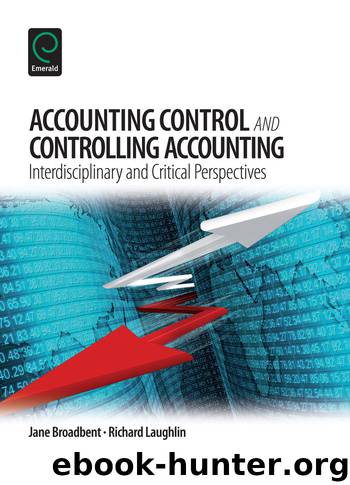Accounting Control and Controlling Accounting by Jane Broadbent

Author:Jane Broadbent
Language: eng
Format: epub
Publisher: Emerald Group Publishing Limited
Published: 2013-03-16T16:00:00+00:00
5.2.2. An Extension of Narrative Accountability Reporting into Governance, Internal Control and Risk Management
The requirement to produce reports about the governance, internal control and risk management practices of any organisation is something of an extension into wider forms of accountability. In the United Kingdom these requirements are again led by the private sector and are the responsibility of the oversight body of the ASB,9 namely the Financial Reporting Council (FRC). As the FRC’s website makes clear:
The Financial Reporting Council is the UK’s independent regulator responsible for promoting high quality corporate governance and reporting to foster investment. We promote high standards of corporate governance through the UK Corporate Governance Code. We set standards for corporate reporting and actuarial practice and monitor and enforce accounting and auditing standards. We also oversee the regulatory activities of the actuarial profession and the professional accountancy bodies and operate independent disciplinary arrangements for public interest cases involving accountants and actuaries. (http://www.frc.org.uk/about/)
The approach to governance reforms in the private sector in the United Kingdom, and in many other countries, consistently place boards of directors as the key focus. Their importance is reflected in Solomon’s (2007, p. 77) portrayal of the board:
A well-functioning and effective board of directors is the holy grail sought by every ambitious company. A company’s board is its heart and as a heart it needs to be healthy, fit and carefully nurtured for the company to run effectively. …The free and accurate flow of information in and out of the board is as essential to the healthy operating of the corporate body as the free and unhindered flow of blood is to the healthy functioning of the human body.
However, not all share Solomon’s portrayal of the importance of the board of directors. An anonymous executive cited in Leighton and Thain (1997, p. 51) and quoted in Carver (2007, p. 1031) maintained that:
… our board is like a bunch of ants…on top of a big log carried by a turbulent current swiftly down a river. The ants think they are steering the log.
Whatever the truth, the importance of boards of directors is in the main a cherished, largely unquestioned assumption underlying all manner of regulations, most notably governance regulations.
As part of its concentration on boards of directors, the Cadbury Report (1992) highlighted four other characteristics related to governance reforms. First, changes in governance codes are often a reaction to corporate financial scandals. The formation of the Cadbury Committee followed soon after Robert Maxwell’s pension scandal became public. The Cadbury Report and Code addressed a number of the perceived failings related to board configuration, transparency and audit that the Maxwell case demonstrated. They aimed to make good management practice, that good governance should engender, transparent. Subsequent changes to these governance codes and the consequent changing model of ‘good management’ have derived from further financial scandals.10 Second, the Committee established the principle that all UK codes would be ‘voluntary’, with an expectation of compliance but with a requirement to explain when this does not occur. This ‘comply
Download
This site does not store any files on its server. We only index and link to content provided by other sites. Please contact the content providers to delete copyright contents if any and email us, we'll remove relevant links or contents immediately.
Zero to IPO: Over $1 Trillion of Actionable Advice from the World's Most Successful Entrepreneurs by Frederic Kerrest(4569)
Machine Learning at Scale with H2O by Gregory Keys | David Whiting(4313)
Never by Ken Follett(3957)
Harry Potter and the Goblet Of Fire by J.K. Rowling(3857)
Ogilvy on Advertising by David Ogilvy(3622)
Shadow of Night by Deborah Harkness(3368)
The Man Who Died Twice by Richard Osman(3079)
Book of Life by Deborah Harkness(2939)
The Tipping Point by Malcolm Gladwell(2922)
Will by Will Smith(2920)
Purple Hibiscus by Chimamanda Ngozi Adichie(2854)
0041152001443424520 .pdf by Unknown(2846)
My Brilliant Friend by Elena Ferrante(2831)
How Proust Can Change Your Life by Alain De Botton(2814)
How to Pay Zero Taxes, 2018 by Jeff A. Schnepper(2655)
Hooked: A Dark, Contemporary Romance (Never After Series) by Emily McIntire(2554)
Rationality by Steven Pinker(2364)
Can't Hurt Me: Master Your Mind and Defy the Odds - Clean Edition by David Goggins(2341)
Borders by unknow(2315)
